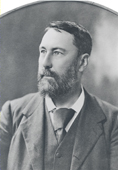
|
 |
Senator for New South Wales 1901-1903 |
|
Richard (Dick) O’Connor was born at Glebe, New South Wales, educated in Sydney and called to the Bar in 1876. O’Connor entered the New South Wales Legislative Council in 1887 and held a number of influential positions including Solicitor-General. He was co-founder with Edmund Barton of the Australasian Federation League of New South Wales (1893) and the Central Federation League (1896). He was a delegate to the People’s Federal Convention and the Australasian Federal Convention of 1897-98 and contributed to the drafting of Australia’s constitution through his involvement on the Constitutional Drafting Committee.
In March 1901 O’Connor was elected to represent New South Wales in the Senate at the first federal election, having been appointed a member of the first Commonwealth ministry in January 1901. He was the only Protectionist senator returned for New South Wales and joined Barton’s ministry as Vice-President of the Executive Council. As Leader of the Government in the Senate, O’Connor was particularly involved in securing the passage of the Customs Tariff Bill in 1902 and the Judiciary Bill (which established the High Court of Australia) in 1903. In September 1903 he resigned from the Senate and was appointed as one of three members of the High Court bench.
O’Connor was a committed and diligent senator and High Court judge, well respected in both legal and parliamentary circles and well known for his dedication to his family. Two of O’Connor’s four sons were killed in France during World War I.
previous | list of members | next
|
 |
|


